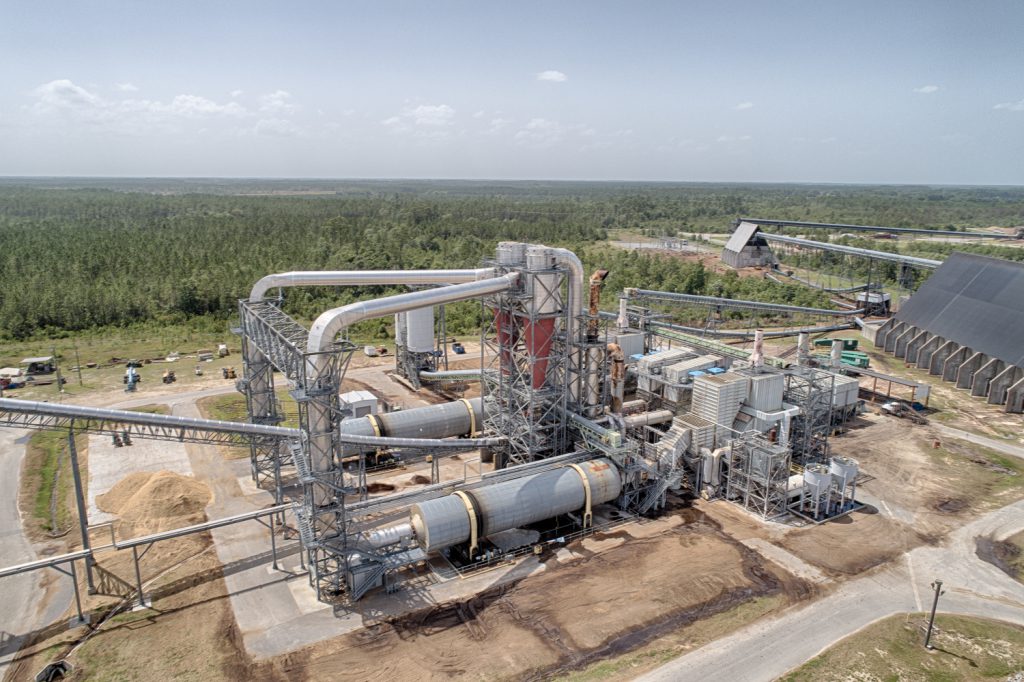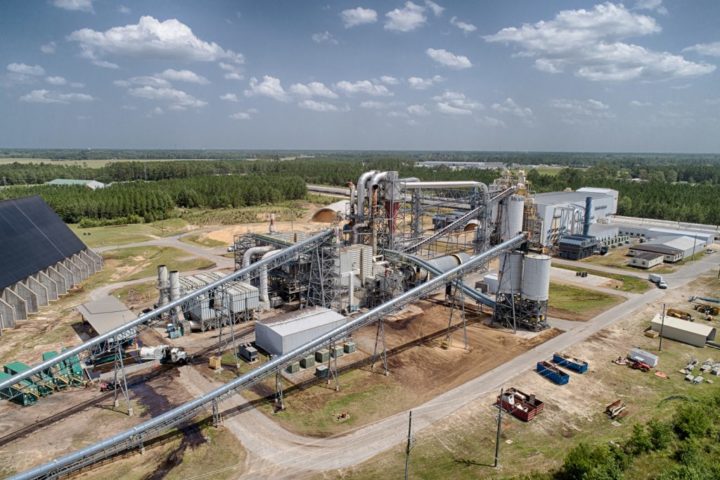Enviva Completes Acquisition of Georgia Biomass and its Waycross Production Plant

BETHESDA, Md., August 3, 2020 — Enviva Partners, LP (“Enviva” or the “Partnership”), a leading global energy company specializing in sustainable wood bioenergy, today announced the completion of its previously announced acquisition of a world-class, industrial scale wood pellet production plant in Waycross, Georgia, and associated contracted terminal capacity in Savannah, Georgia. Enviva’s growing operational footprint across the U.S. Southeast now includes nine wood pellet production plants and five deep-water export terminals across Virginia, North Carolina, South Carolina, Georgia, Alabama, Mississippi, and Florida.
“We are excited to welcome the entire Waycross team into the Enviva family,” said John Keppler, Chairman and Chief Executive Officer of Enviva. “This is an important step for Enviva’s growth and we look forward to continuing to be a great employer, customer, and neighbor, and an important contributor to the State of Georgia, a community we now call home.”
The newly acquired Waycross plant has been operating since 2011 and has a production capacity of approximately 800,000 metric tons per year, all of which is exported through the Port of Savannah to Enviva’s customers under long-term take-or-pay off-take contracts, many of which extend until the mid-2040s. Following the acquisition, Enviva’s total annual wood pellet production capacity is approximately 4.9 million metric tons. With the acquisition complete, the Waycross plant is now called, “Enviva Pellets Waycross.”

“The Waycross plant, its leadership, and the entire team are a perfect match for Enviva,” said Royal Smith, Executive Vice President of Operations of Enviva. “The Waycross team, under the exceptional leadership of Mark Gaddy, has been recognized for years for their commitment to and strong track record of safe operations and high performance. We look forward to working with Mark and his team in the years to come as we seek to build on their success, grow the business, and continue making a meaningful difference right now in the effort to fight climate change around the world.”
Enviva’s mission is to displace coal, grow more trees, and fight climate change. The Waycross plant acquisition diversifies Enviva’s manufacturing footprint and expands its operations in a region that supplies one-fifth of the timber used globally each year. Enviva currently is integrating the plant into the wider Enviva organization and looks forward to working closely with local leaders, private forest landowners, and conservation organizations to continue to make a positive impact across the State of Georgia.
BMO Capital Markets advised the Partnership and Vinson & Elkins LLP served as legal counsel on the transaction.
About Enviva Partners, LP
Enviva Partners, LP (NYSE: EVA) is a publicly traded master limited partnership that aggregates a natural resource, wood fiber, and processes it into a transportable form, wood pellets. The Partnership sells a significant majority of its wood pellets through long-term, take-or-pay off-take contracts with creditworthy customers in the United Kingdom and Europe. The Partnership owns and operates nine plants with a combined production capacity of approximately 4.9 million MTPY in Virginia, North Carolina, South Carolina, Georgia, Mississippi, and Florida. In addition, the Partnership exports wood pellets through its marine terminals at the Port of Chesapeake, Virginia and the Port of Wilmington, North Carolina and from third-party marine terminals in Savannah, Georgia, Mobile, Alabama, and Panama City, Florida. To learn more about Enviva Partners, LP, please visit our website at www.envivabiomass.com and follow us on social media @Enviva.
Cautionary Note Concerning Forward-Looking Statements
Certain statements and information in this press release may constitute “forward-looking statements.” The words “believe,” “expect,” “anticipate,” “plan,” “intend,” “foresee,” “should,” “would,” “could,” or other similar expressions are intended to identify forward-looking statements, which are generally not historical in nature. These forward‑looking statements are based on the Partnership’s current expectations and beliefs concerning future developments and their potential effect on it. Although management believes that these forward-looking statements are reasonable as and when made, there can be no assurance that future developments affecting the Partnership will be those that it anticipates. All comments concerning the Partnership’s expectations for future revenues and operating results are based on the forecasts for its existing operations and do not include the potential impact of any future acquisitions. The Partnership’s forward-looking statements involve significant risks and uncertainties (some of which are beyond the Partnership’s control) and assumptions that could cause actual results to differ materially from the its historical experience and its present expectations or projections. Important factors that could cause actual results to differ materially from those in the forward-looking statements include, but are not limited to: (i) the volume and quality of products that it is able to produce or source and sell, which could be adversely affected by, among other things, operating or technical difficulties at the Partnership’s wood pellet production plants or deep-water marine terminals; (ii) the prices at which the Partnership is able to sell the its products; (iii) the Partnership’s ability to successfully negotiate and complete and integrate drop-down and third-party acquisitions, including the associated contracts, or to realize the anticipated benefits of such acquisitions; (iv) failure of the Partnership’s customers, vendors, and shipping partners to pay or perform their contractual obligations to it; (v) the Partnership’s inability to successfully execute its project development, expansion, and construction activities on time and within budget; (vi) the creditworthiness of the Partnership’s contract counterparties; (vii) the amount of low-cost wood fiber that it is able to procure and process, which could be adversely affected by, among other things, disruptions in supply or operating or financial difficulties suffered by the Partnership’s suppliers; (viii) changes in the price and availability of natural gas, coal, or other sources of energy; (ix) changes in prevailing economic conditions; (x) unanticipated ground, grade or water conditions; (xi) inclement or hazardous environmental conditions, including extreme precipitation, temperatures, and flooding; (xii) fires, explosions, or other accidents; (xiii) changes in domestic and foreign laws and regulations (or the interpretation thereof) related to renewable or low-carbon energy, the forestry products industry, the international shipping industry, or power, heat or combined heat and power generators; (xiv) changes in the regulatory treatment of biomass in core and emerging markets; (xv) the Partnership’s inability to acquire or maintain necessary permits or rights for the Partnership’s production, transportation, or terminaling operations; (xvi) changes in the price and availability of transportation; (xvii) changes in foreign currency exchange rates or interest rates, and the failure of the Partnership’s hedging arrangements to effectively reduce its exposure to the risks related thereto; (xviii) risks related to the Partnership’s indebtedness; (xix) the Partnership’s failure to maintain effective quality control systems at its production plants and deep-water marine terminals, which could lead to the rejection of the Partnership’s products by its customers; (xx) changes in the quality specifications for the Partnership’s products that are required by its customers; (xxi) labor disputes; (xxii) the Partnership’s inability to hire, train, or retain qualified personnel to manage and operate its business and newly acquired assets; (xxiii) the effects of the exit of the United Kingdom from the European Union on the Partnership’s and its customers’ businesses; (xxiv) the Partnership’s inability to borrow funds and access capital markets; and (xxv) viral contagions or pandemic diseases, such as the recent outbreak of a novel strain of coronavirus known as COVID-19.
For additional information regarding known material factors that could cause the Partnership’s actual results to differ from projected results, please read our filings with the U.S. Securities and Exchange Commission (the “SEC”), including the Annual Report on Form 10-K and the Quarterly Reports on Form 10-Q most recently filed with the SEC. Readers are cautioned not to place undue reliance on forward-looking statements, which speak only as of the date thereof. The Partnership undertakes no obligation to publicly update or revise any forward-looking statements after the date they are made, whether as a result of new information or future events or otherwise.
